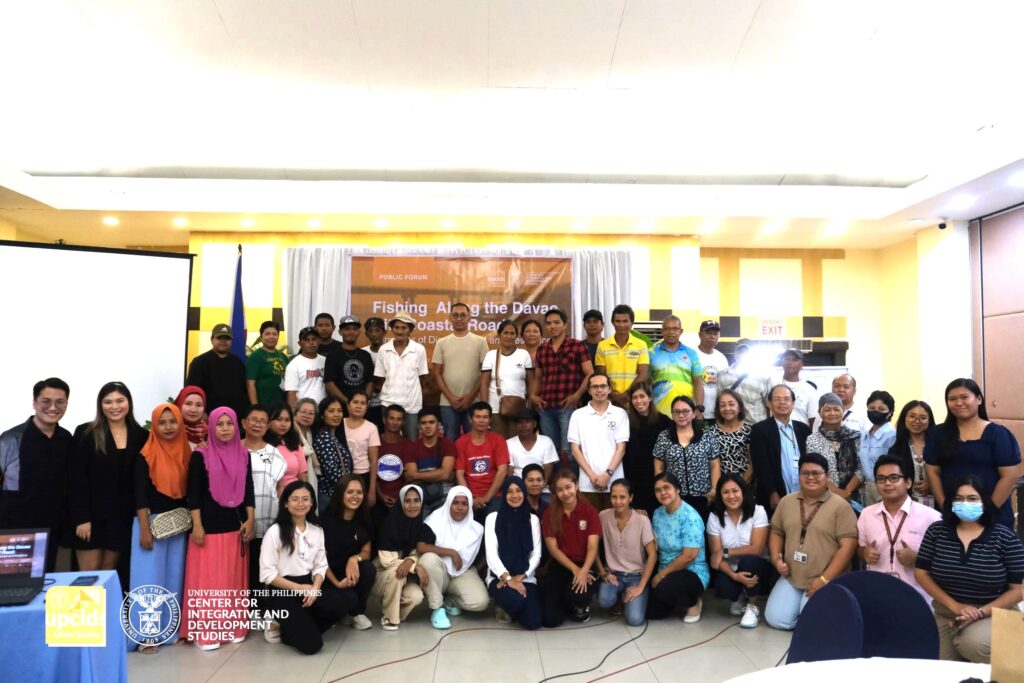 Fisherfolks, barangay representatives, academics, and representatives from various government agencies discussed the Davao City Coastal Road project and its socio-cultural and economic impacts on urbanization and the city’s coastal communities in the public forum for the research project “Fishing Along the Davao City Coastal Road: Narratives of Displacement and Resilience,” held on November 22, 2024 at The Ritz Hotel, Davao City.
Fisherfolks, barangay representatives, academics, and representatives from various government agencies discussed the Davao City Coastal Road project and its socio-cultural and economic impacts on urbanization and the city’s coastal communities in the public forum for the research project “Fishing Along the Davao City Coastal Road: Narratives of Displacement and Resilience,” held on November 22, 2024 at The Ritz Hotel, Davao City.
Asst. Prof. Ryan Songcayauon and Prof. Raymundo Pavo of the University of the Philippines (UP) Mindanao, the proponents of the Davao City-based research, aim to investigate the effects of the coastal road by capturing the narratives of the fisherfolks and fishing communities living in the area and inform the local government units and national agencies of possible policies for managing coastal communities amid urban development.
Through the forum, the researchers sought to provide a platform for discussing the preliminary findings of the study, to foster collaboration among the participants, and facilitate critical conversations to shape people-centered policies for inclusive development and urban sustainability.
Dr. Sophremiano Antipolo, the keynote speaker, presented the Philippine Project Planning and Development Processes, and Engr. James Lee Arieta of the Department of Public Works and Highways (DPWH) Region XI presented an overview of the coastal road project and its implementation updates.
The research team presented the results of the study, highlighting key findings, such as the disruptions in access to traditional fishing areas, shifting identities and livelihoods of fishing households, and the community’s adaptation to urbanization.
These insights led to robust dialogue that raised relevant questions concerning, including:
- The progress of the proposed Community Fish Landing Center
- Community consultation and displacement of mangroves by riprapping projects
- Impact of coastal road construction on 4Ps beneficiaries
- Relocation of displaced communities and support for women
- Defining boundaries for waterfront activities
- Barangay market development
- Suggestions for improving livelihood and support for fisherfolk through the creation of payaw
Concerns were also raised about the ecological impacts of the road on marine resources. Another point raised was if there is an identified politician who can use the coastal road study as reference to craft policies on future big projects that could impact the vulnerable communities of the city.
Most of the questions raised were addressed by the various resource persons to the extent of their knowledge. The forum concluded with a collective acknowledgment of the results presented by the proponents and information shared by the speakers. The project proponents declared that the discussions were useful for the preparation of their report.
The research project is funded under the Urban Studies Program of the UP Center for Integrative and Development Studies (UP CIDS), the policy research unit of the University of the Philippines. The team of Asst. Prof. Songcayauon and Prof. Pavo is supported by Senior Research Assistant Anna Mae Dalugdog and Administrative Assistant Marie Grace Aponte.
#SDG1NoPoverty #SDG2ZeroHunger #SDG8DecentWorkAndEconomicGrowth #SDG9IndustryInnovationAndInfrastructure
